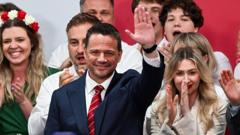Polish voters have cast their ballots in a closely watched presidential election that has left the outcome too close to call, with exit polls showing only a slight lead for liberal candidate Rafal Trzaskowski. The exit poll results broadcast right after polls closed suggest that Trzaskowski garnered 50.3% of the votes, just narrowly ahead of conservative historian Karol Nawrocki, who received 49.7%.
Amid the excitement at his campaign headquarters in Warsaw, Trzaskowski celebrated what he claimed was a victory but acknowledged that the results are within the margin of error. "We won," he declared, addressing a cheering crowd, while humorously nodding to the tight nature of the election by saying the phrase "razor's edge" would now be immortalized in Polish political discourse. His wife, Malgorzata, added a light moment as she joked about being on the verge of a heart attack.
In contrast, Nawrocki echoed the uncertainty of the results to his supporters, urging them to remain hopeful for a late-night turnaround. "Let’s not lose hope for this night. The difference is minimal," he said, expressing confidence in a potential victory by morning.
While the Polish presidency is primarily ceremonial with limited authority over foreign and defense policies, the role carries significant influence, including the ability to veto legislation. The current president, Andrzej Duda, has used his powers to obstruct key legislative initiatives from Prime Minister Donald Tusk’s pro-EU coalition. If Trzaskowski's lead is affirmed, he could remove this legislative hurdle, enabling Tusk's government to align more closely with European dynamics.
Conversely, a Nawrocki win would intensify tensions between the presidency and parliament and provide a boost to his party, the Law and Justice (PiS), which lost governing power 18 months ago. Both candidates stand on a platform of supporting neighboring Ukraine amid ongoing regional conflicts, but diverge over the EU, with Trzaskowski favoring integration while Nawrocki advocates for national sovereignty.
Trzaskowski, at 51, brings experience as mayor of Warsaw and a background in European affairs, appealing primarily to younger, urban voters. His efforts to appear patriotic during the campaign, including a tougher stance on issues like illegal immigration, have been met with skepticism from some voters who regard him as disconnected from everyday Poles.
On the other hand, at 42, Nawrocki has gained visibility as a conservative figure promoting traditional family values, though controversies surrounding his past and claims have plagued his campaign. Allegations from various press sources about his alleged misconduct as well as challenges to his integrity have not significantly impacted his support base.
As both candidates prepare for the final results, anticipation grows around how this electoral battle might shape the future political landscape of Poland. With tensions high and a deeply divided electorate, this election is shaping up to be one of the most pivotal moments in recent Polish history.
Amid the excitement at his campaign headquarters in Warsaw, Trzaskowski celebrated what he claimed was a victory but acknowledged that the results are within the margin of error. "We won," he declared, addressing a cheering crowd, while humorously nodding to the tight nature of the election by saying the phrase "razor's edge" would now be immortalized in Polish political discourse. His wife, Malgorzata, added a light moment as she joked about being on the verge of a heart attack.
In contrast, Nawrocki echoed the uncertainty of the results to his supporters, urging them to remain hopeful for a late-night turnaround. "Let’s not lose hope for this night. The difference is minimal," he said, expressing confidence in a potential victory by morning.
While the Polish presidency is primarily ceremonial with limited authority over foreign and defense policies, the role carries significant influence, including the ability to veto legislation. The current president, Andrzej Duda, has used his powers to obstruct key legislative initiatives from Prime Minister Donald Tusk’s pro-EU coalition. If Trzaskowski's lead is affirmed, he could remove this legislative hurdle, enabling Tusk's government to align more closely with European dynamics.
Conversely, a Nawrocki win would intensify tensions between the presidency and parliament and provide a boost to his party, the Law and Justice (PiS), which lost governing power 18 months ago. Both candidates stand on a platform of supporting neighboring Ukraine amid ongoing regional conflicts, but diverge over the EU, with Trzaskowski favoring integration while Nawrocki advocates for national sovereignty.
Trzaskowski, at 51, brings experience as mayor of Warsaw and a background in European affairs, appealing primarily to younger, urban voters. His efforts to appear patriotic during the campaign, including a tougher stance on issues like illegal immigration, have been met with skepticism from some voters who regard him as disconnected from everyday Poles.
On the other hand, at 42, Nawrocki has gained visibility as a conservative figure promoting traditional family values, though controversies surrounding his past and claims have plagued his campaign. Allegations from various press sources about his alleged misconduct as well as challenges to his integrity have not significantly impacted his support base.
As both candidates prepare for the final results, anticipation grows around how this electoral battle might shape the future political landscape of Poland. With tensions high and a deeply divided electorate, this election is shaping up to be one of the most pivotal moments in recent Polish history.

















